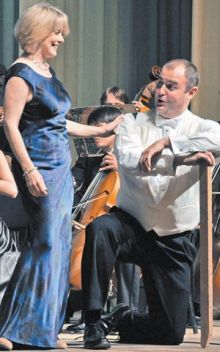The international festival of classical music “Kharkiv Assemblies” has celebrated its 20th anniversary. It will be reminded that the music event that took place in Kharkiv in September 1991 started the traditional festival “Kharkiv Assemblies,” currently well known abroad. It can be said even that Kharkiv musicians are recognized in the world because they belong to this creative forum, which took place for the first time 20 years ago under the slogan “Mozart’s Days in Kharkiv” (Mozart-Tage in Kharkov). This year the forum was called “Mozart Again and Forever.”
For the organizer and ideologue of the festival, rector of the Kharkiv University of Arts Tetiana Verkina, the Assemblies was a realization of her cherished dream to bring back to her city the fame of a big cultural center. She thought it was necessary to revive and strengthen the traditions through which the musicians who studied in Kharkiv and acquired worldwide recognition are connected with this city. Naturally, it was very important to create a music feast, where the first fiddle would be played by Kharkiv performers.
Full of sparkling optimism, Mozart really helped the organizers of the festival “Kharkiv Assemblies,” who since then have always chosen a hero or heroes and corresponding slogan for the festival. On the other hand, in uneasy and politically unstable 1991 the festival was the first creative forum in Ukraine and maybe in the former USSR, in no way connected with the ideology and the party’s demands. However, the local authorities have always encouraged and supported this extraordinary initiative, which was not in the last place owing to Verkina’s authority.
The idea of the festival was also supported by the musicians who studied at the Kharkiv Music School and Institute of Arts. Local and international ensembles started to take shape and pedagogues began to give workshops, which is another attribute of the world experience in preparation and education of musicians. There were also artistic exhibits, close to the theme of the ensembles and scholarly conferences, resulting in publishing collections of materials, which has already become a tradition.
The topic of the Assemblies-2011 was “Profession of a musician in the time and space of historical-cultural metamorphosis,” which best meets the creative guideline of the festival. There was a meeting with former resident of Kharkiv, currently professor at the National Music Academy of Ukraine Maryna Cherkashyna-Hubarenko. A representative of the well-known music-theater dynasty, she is currently one of the most influential experts in the sphere of opera art, a person of a universal creative character. Besides, she is a passionate promoter of the creative work of the wonderful composers Vitalii Hubarenko and Iryna Hubarenko who, unfortunately, are not with us today.
The high rating of the Kharkiv Assemblies-2011 was proved by the participation of such famous British musicians as conductors Timothy Reynish, Rachel Young, singers Joan Rodgers and Darren Jefferey, the outstanding pianist Graham Scott. The parade of conductors who performed with the Slobozhansky Youth Academic Symphonic Orchestra was continued by Dmitry Liss from Russia and chief conductor of the Athens State Orchestra Viron Fidecis. Especially typical for the Assemblies are joint projects of performers from Ukraine and Germany, Switzerland, Spain and other European countries. It is no more surprising when foreign countries are announced during the concerts after Ukrainian or Russian names. This has become an attribute of the time, at which one can rejoice or be sad about it to the music of Mozart.
Verkina, whose enthusiasm has not exhausted in the long period of creative and organization work, frequently emphasizes that classical music has always helped people to live through poverty, forget about everyday problems and routine. But this does not mean that the participants of the festival want to seclude themselves in an ivory castle. On the contrary, the programs of the concerts of the Kharkiv Assemblies are not only educative, but also democratic and open, in terms of admission fees as well.
The festival has not lost its audience, which is sensitive and demanding, and at the time they understand real artistic values. The musicians also consider themselves “the parishioners of the music church,” wherever they have studied and performed before.







